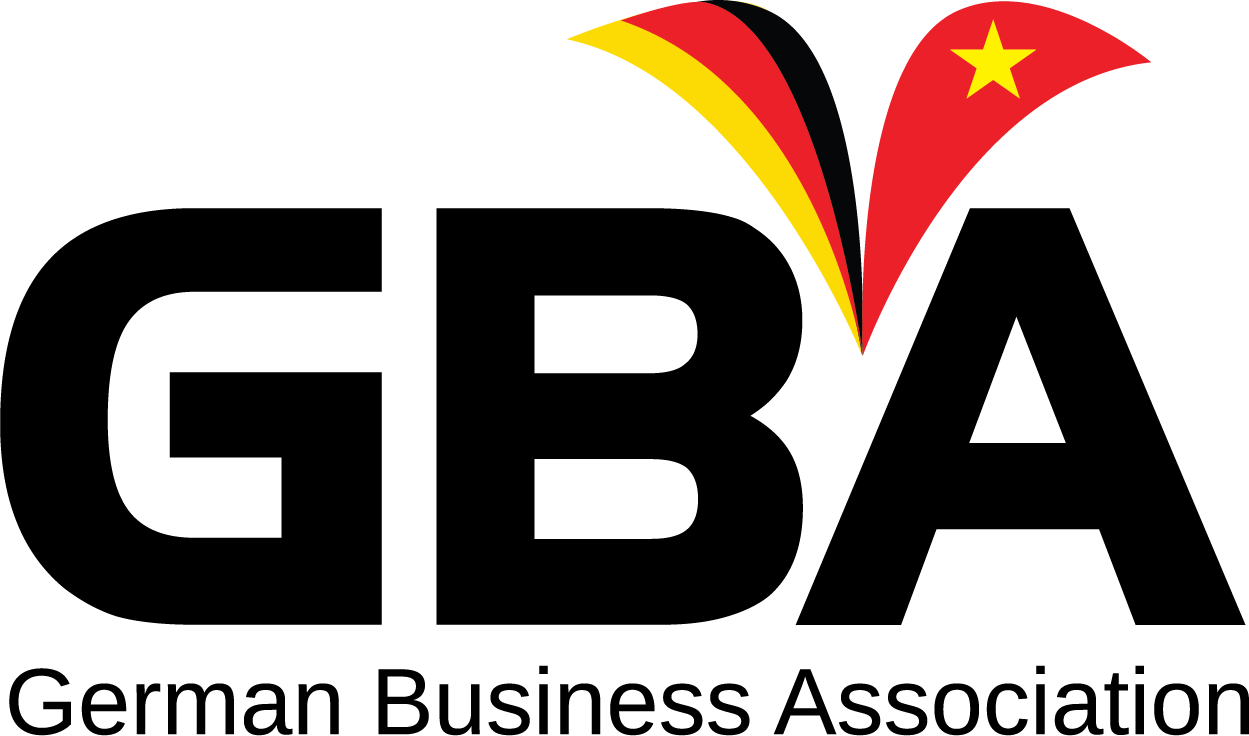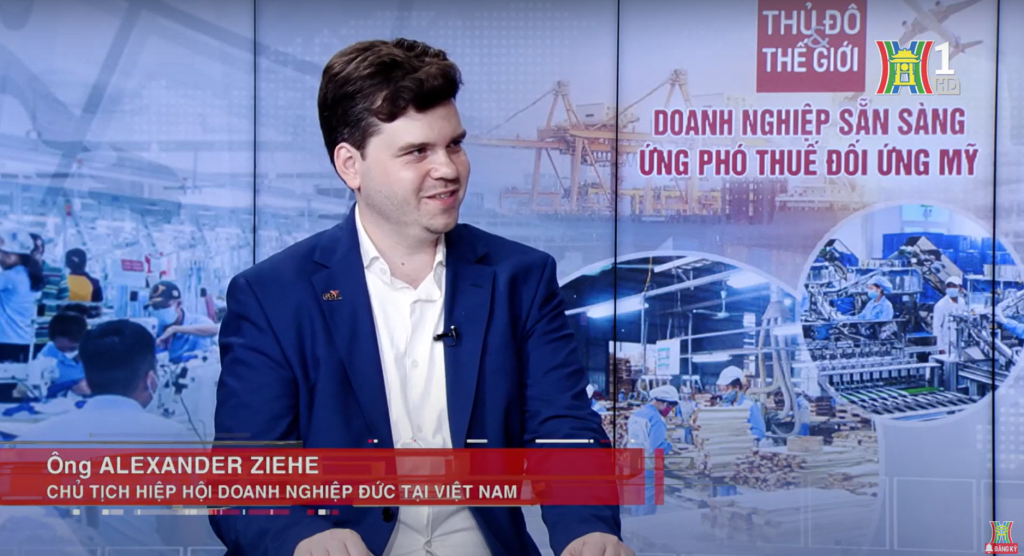Amid intensifying global trade tensions and growing uncertainty around U.S. tariff measures, Hanoi Television conducted an exclusive interview with Mr. Alexander Ziehe, Chairman of the German Business Association (GBA), to explore how German-invested enterprises in Vietnam and local suppliers are adapting to these developments. The interview took place shortly after the second round of bilateral trade negotiations between Vietnam and the United States in Washington D.C. in May 2025. These talks have raised hopes for a more stable trade environment and expanded market access for both sides. As U.S. tariffs continue to rise—particularly on steel and other key sectors—businesses are proactively restructuring supply chains and seeking new export opportunities.
In this timely conversation, Mr. Alexander Ziehe shared valuable insights into how German FDI enterprises are navigating tariff challenges by restructuring supply chains, diversifying export markets across the EU, ASEAN, and the broader Asia-Pacific, and reinforcing Vietnam’s position as a regional manufacturing and export hub.
Explore the full interview (in Vietnamese) here>>> and below is the English script.
Question 1: Mr. Alexander, since President Donald Trump took office, there have been many changes, especially in tariffs. How are German FDI enterprises in Vietnam preparing for U.S. tariff increases, and what adjustments are being made to supply chains and export markets?
Many German sourcing companies are responding positively. Vietnamese suppliers are now more eager to integrate with the EU market, which our members in food and consumer goods welcome. Beyond the U.S., there are promising export opportunities with the EU, Canada, Australia, and Asia. Vietnam is becoming a regional production hub. Companies are shifting focus from the U.S. to ASEAN strategies, and we’ve seen increased German investment here, not only for export but also domestic consumption—brands like Mercedes Cer, Hettich, and Häfele are great examples.
Question 2: What are the main challenges for businesses trying to shift supply chains or adapt to new investment environments?
Uncertainty is the biggest challenge. Tariff rates are unpredictable, making long-term planning difficult. German companies invest heavily in machinery and human resources, so they can’t just relocate easily. They need sustainable strategies. Another challenge is political uncertainty—businesses now must consider geopolitics more seriously, not just economics.
Question 3: Do German companies have any recommendations for Vietnamese localities or the government regarding U.S. tariffs?
We fully support the Vietnamese government’s negotiation efforts, which provide clarity for businesses. We also encourage Vietnam to take a proactive leadership role in regional trade. For German firms, Vietnam can be a gateway to ASEAN, India, and China. We’ve made recommendations on infrastructure and administrative reforms—especially removing outdated licensing procedures—to speed up investment and create value faster.
Question 4: Since President Donald Trump took office, we’ve seen many changes, especially in tariffs. In light of rising U.S. tariffs, how have German FDI enterprises in Vietnam been preparing, and what changes have you observed in their supply chains and export markets?
We’ve observed some very interesting trends. For example, German sourcing companies have shared positive feedback regarding tariffs. Vietnamese suppliers are now more focused on integrating into trade with the EU, which is seen as a positive development. Our members in food procurement or consumer goods, for instance, have responded optimistically.
Looking at other sectors, there are also opportunities to pivot to alternative export markets. The EU remains a global economic powerhouse, and markets like Canada, Australia, and other parts of Asia are growing. Vietnam has become a strong regional manufacturing and export hub. As a result, many companies are no longer reliant on the U.S. market. Instead, they are shifting their business strategies toward Southeast Asia and the ASEAN, where Vietnam can act as a strategic springboard. This is very promising.
This is evidenced by the increasing number of German companies investing in Vietnam recently. Some well-known names are now using their Vietnam-based factories not only for exports but also to serve the domestic market. Many renowned German brands are recognizing Vietnam not just as a manufacturing base but also as an attractive consumer market—such as Mercedes-Benz, and in home and kitchen appliances, brands like Hettich and Hafele. German brands are gaining more traction here, and I believe this presents an opportunity for companies to rethink their strategies: to reduce reliance on exports and enhance their domestic market focus while tapping into other promising markets.
Question 5: Given the current context, export markets clearly need to be diversified. In your view, what are the main challenges businesses face when shifting supply chains or adapting to a new investment environment?
The first challenge is uncertainty. We’ve discussed tariffs ranging from 10% to possibly 20% or even 46%. No one knows the final outcome, and that creates a major hurdle for businesses in terms of planning and building long-term strategies.
While some production types are easy to relocate, this isn’t the case for German companies, where processes are carefully planned and require significant investment in machinery, workforce training, and more. They don’t want to move operations just to save a few percentage points in cost. They’re aiming for sustainable strategies based on their current setups. The main challenge, then, is ensuring stability in a constantly changing global environment and being able to respond to fluctuating demand.
The second challenge is political uncertainty. The U.S. used to be seen as a champion of free trade, but that perception is shifting. This political instability forces companies to pay closer attention to political developments, instead of focusing solely on doing business—a major shift and a learning curve for many firms. The challenges come not only from Vietnam, but also from the U.S. side.
Question 6: Do German businesses have any proposals or recommendations for local governments, including Hanoi, or the Vietnamese government, in response to the reciprocal tariffs imposed by the U.S.?
First and foremost, we support the Vietnamese government in its current negotiation efforts. This is the right approach—regardless of the outcome, clarity is essential. We’ve provided positive feedback that Vietnam is among the first countries to proactively engage in such talks.
We also encourage Vietnam to take a leading role in promoting free trade across the region. If Vietnam can serve as a production base and gateway to other markets, it will attract more German businesses looking to build their brands and expand into India, China, and especially the broader ASEAN market.
In terms of administrative reform, we’re working closely with EuroCham to offer several recommendations—from addressing bottlenecks in industrial zones to supporting the development of airports. Ho Chi Minh City, for example, remains a major logistical bottleneck, limiting its potential as a regional and global economic hub.
We acknowledge that reforms have begun, but more needs to be done. For instance, permit systems should be streamlined or removed entirely, as seen in many other countries, which helps accelerate investment and create local value more quickly. That’s vital for businesses.
The United States is expected to announce new tariffs on 75 countries, including Vietnam. If high countervailing duties are applied, they could significantly impact key Vietnamese exports like textiles, footwear, wood, and electronics. Many of these sectors are currently reliant on contract manufacturing and U.S. markets. In response, Vietnamese exporters are urged to diversify markets, strengthen supply chains, and leverage FTAs. This challenge also presents an opportunity for Vietnamese firms to move up the value chain, enhance branding, and reduce dependency on any single market, especially the U.S.

